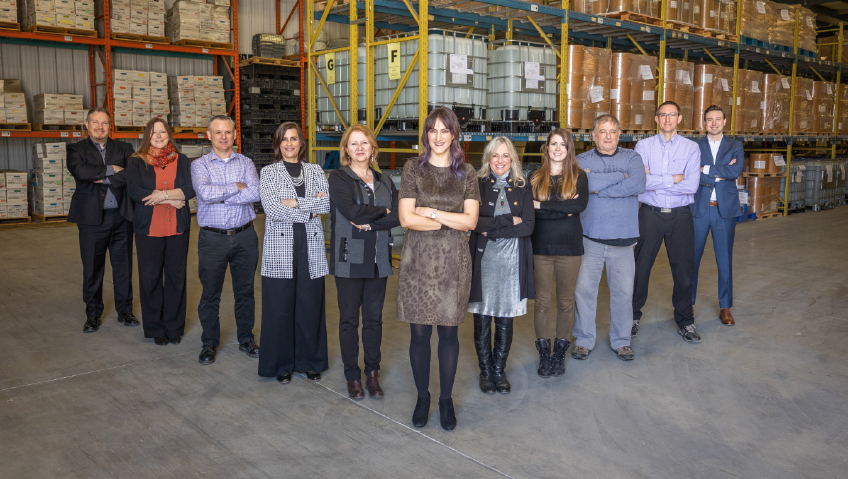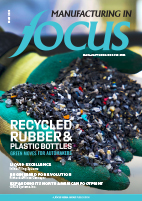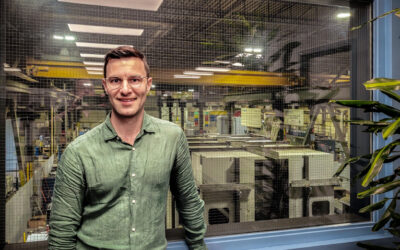As a woman-owned company, specialty chemical distributor Netchem Inc. knows how to raise the bar when it comes to cultivating excellence by embracing diversity. The company has built a reputation for being an expert in diversifying client supply chains across North America. It is also known for solving procurement issues. After nearly thirty-one years in this niche industry, this company is as market-savvy and streamlined for success as one can be.
Headquartered in Brantford, Ontario—around one hour from Toronto—the company operates from its 30,000-square-foot main distribution facility supported by several satellite distribution hubs across North America. This small yet mighty team packs a powerful punch when it comes to serving some of the U.S. and Canada’s most prestigious Fortune 500 manufacturers, shipping as far afield as Mexico and beyond.
“We aim to be the preferred chemical supply chain partner to North American manufacturers big and small. If you buy chemicals, Netchem has the expertise to help ease your supply chain stress. You will love working with our team!” says Stephanie Khurana, President.
The young, dynamic leader describes the company as a “small business with big business capabilities,” and this is one of its prize features for attracting clients. “It means we can be responsive and act quickly to help our customers, all while still being able to service large projects,” she adds.
To this end, Netchem holds all necessary licenses, including those needed to supply active pharmaceutical ingredients (APIs) in the United States and Canada. “This process was a major undertaking by our regulatory team. Netchem’s quality team is excellent at supporting customers facing increasing regulatory hurdles,” says Khurana.
After having many conversations and sorting many supply chain emergencies on behalf of clients, Khurana has several pieces of sound advice for manufacturers. “Always have more than one supplier for any key material in your supply chain. Supply chain diversification is a critical strategy for your business, not a project for a rainy day,” she says, pointing out that most businesses should have learned this lesson due to COVID-19.
The reality of straining supply chains continues, as Khurana makes very clear. “Supply chains are buckling under the cumulative strain of the past two years. [Before] the COVID-19 pandemic, supply chains were optimized for efficiency and low costs which removed a lot of excess capacity and redundancy,” she says. “We are paying the price for that now. Some areas of the supply chain are unable to cope with the strain. For example, consider the port of Los Angeles—which is still backlogged—and the frequent lack of available trucking to move goods from ports to their destination,” Khurana continues. These are pretty serious issues.
Khurana could not be more pleased with her team for shining in the face of adversity over the past two years as they have battled COVID-19 market challenges as well as those in their personal lives. “Each member of the team has risen to this challenge. Living with and working through COVID has taken a personal and professional toll on everyone, and I could not be more grateful to everyone at Netchem. We have been able to step in and support businesses where major producers in the supply chain have gone offline,” she says.
This is key because, in Khurana’s experience, small, diversity-driven businesses do not always have the same access to large corporate customers as larger, publically traded firms. “While many large corporations have a supplier diversity program, the integration of this program with corporate procurement is lacking,” she says. “Businesses who incorporate supplier diversity programs report that this drives value through their organization. [That] is because having a diverse array of partners allows you to develop better solutions,” she adds.
The company inherits its pragmatism from its founder, Paul Khurana, a chemical engineer and late father to the present-day president. The senior Khurana went into business again in 1991 after discovering that retirement was not entirely his thing.
In those days, ordering chemicals from abroad did not have the advantage of instantaneous communication via the internet. Not only was quality potentially unknown, local manufacturers had no way of being certain that their newfound suppliers were real, let alone in business. As a result, procuring raw materials back then was a perilous affair.
Paul Khurana took the risk out of obtaining quality chemicals on behalf of clients, later evolving the company’s emphasis into offering supply chain support as internet intermediary giants started changing the nature of the chemical supplies market. His daughter Stephanie has become a progressive and accomplished leader, thanks to a family history of valuing higher education. After she had spent several years in the pharmaceutical industry, he invited her to join him in the business. She accepted, realizing how much she loved “the speed at which one can get things done in a small to medium-sized business.”
She accepted but sadly lost her father only three months later, and the road from there was a tough one for the family and the team. With his passing, the business went to Paul’s wife, Laura Khurana. Following her retirement in 2019, her place as president was passed on to Stephanie.
She describes herself as “a proud member of the board and the supplier advisory committee of WBE Canada (Women Business Enterprises, which supports, promotes, and certifies women-owned businesses in Canada) and an advocate for supplier diversity.” Supplier diversity, as described in the WBE report, The State of WBE Certification in Canada – The Suppliers’ Perspective, “extends internal diversity and inclusion (D&I) into the upstream supply chain. It offers firms owned, managed and operated by diverse groups of people (i.e. Indigenous Peoples, LGBTQ+ people, people with disabilities, veterans, visible minorities and/or women) equal opportunity to become suppliers of goods and services.”
Such initiatives remain critical, as Khurana highlights that female business ownership is still quite low, with one such statistic going a long way toward illustrating her point. “In 2017, only 15.6 percent of small and medium enterprises (under 500 employees) in Canada were owned by women,” she adds.
In light of this reality, the new leader makes every effort to encourage healthy diversity in the firm, and she is equally determined to modernize everything about the business, including its image and its operations. Much has been done in service of this goal; there is now stylish new branding, a fresh website, and a consistent online presence. Its internal processes are being overhauled too. The company now has “a more robust [human resources] process and policies that support our team through issues like family leave,” she says.
Another recent addition demonstrates the company’s commitment to continuous improvement. Its informative newsletter shares current information drawn from several fields to support and inform clients who like staying abreast of developments in their markets, as well as those looking for the latest solutions to supply chain challenges. “This only goes out once every month or two, so it won’t clutter your inbox,” Khurana tells me.
Netchem’s team consists of thirteen industry experts, and the company is actively hiring and currently in search of a French-speaking sales team member for its Quebec office. “I work with an incredible team. Having a work environment that is respectful but relaxed is important to me, and I hope I have helped cultivate this at Netchem,” Khurana says. “I believe that work should be a place where people can freely express their opinions and ideas for the betterment of the business. It’s very important to really encourage people to share their views and not just pay lip service to this idea of an open forum.”
She asked her team what makes the company a great place to work. Their responses listed a positive work environment, great people, and flex time among the many factors. Other aspects include the fact that “management trusts and respects each employee’s contribution,” as well as the tremendous effort the company put into protecting staff and clients during the COVID-19 emergency period.
Netchem is also involved in local community projects. Currently, one of its largest contributions goes toward Feed Ontario, a group giving aid to food banks throughout the region. “Over half a million people in Ontario relied on food banks last year. [Readers] can help support food banks across Ontario by donating to Netchem’s campaign for Feed Ontario before April 10, 2022, and we will match [their] donation,” she says of the company’s donation program at https://www.canadahelps.org/en/pages/help-feed-ontario/.
Looking ahead, Netchem, Inc. is set to continue spreading its expertise. As its customers face tricky market conditions with issues that Maersk.com lists as “protectionist trade policies, tariff wars, and industry consolidation,” keeping its ear to the ground is vital to helping them navigate increasingly complex regulatory requirements.
“I believe that supply chain transparency will be the watchword of this decade. Companies and consumers want to understand where their goods are coming from and that the sourcing process is responsible, sustainable and ethical all the way through,” Khurana says.
Stephanie Khurana is determined that Netchem will become, in time, the preferred supplier of North America’s most respected manufacturers and part of the larger, international solution for the “responsible and sustainable sourcing,” of materials. “We are on our way and look forward to making this true for more future customers, and I would say it’s not a vision; it’s a plan!” she says, smiling.













